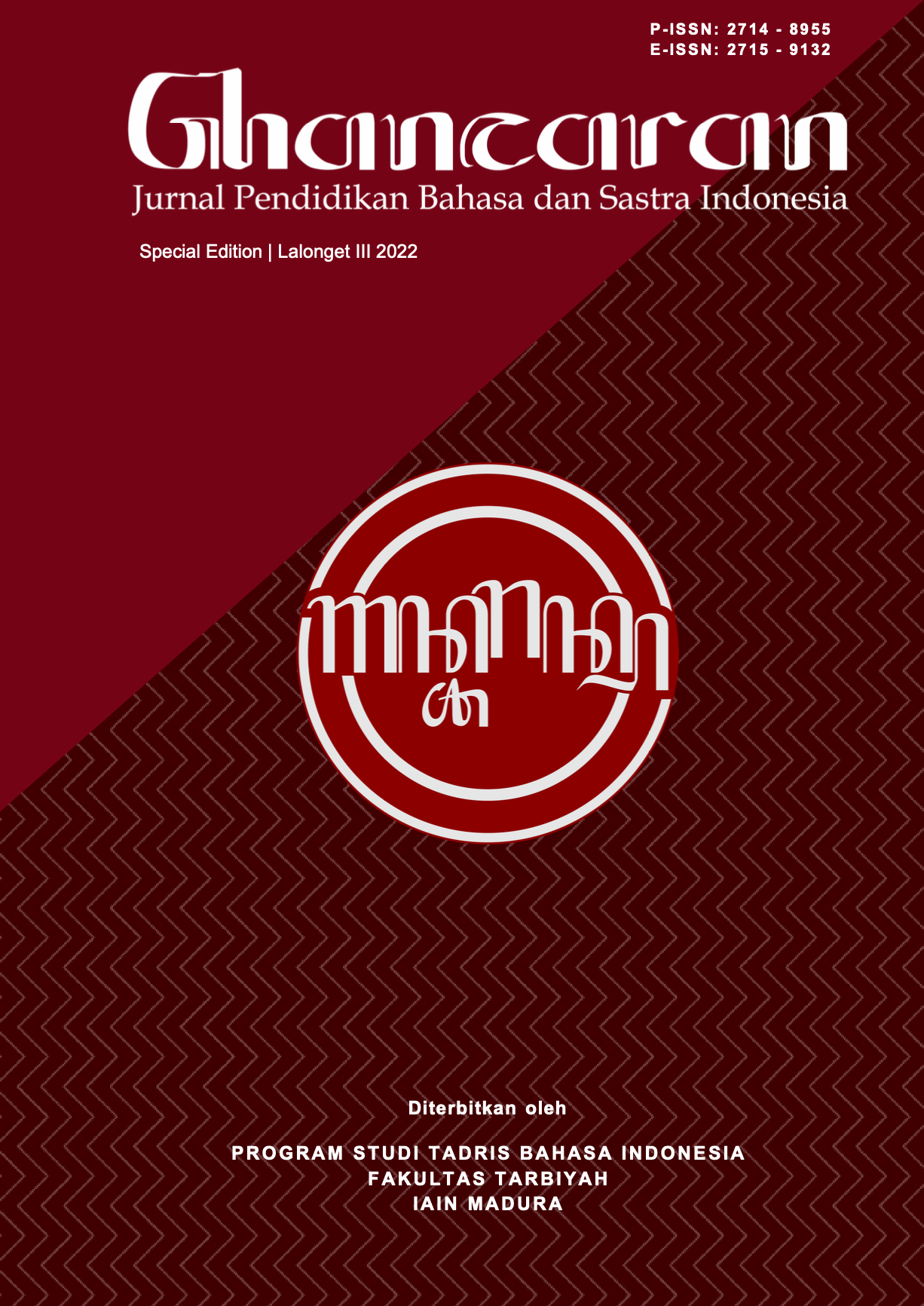Implementasi MB-KM Melalui Metode Mengajar Bahasa Model Pembelajaran Student Center Learning di SMP Gema 45 Surabaya
 Abstract views: 451
,
Abstract views: 451
,
 PDF downloads: 377
PDF downloads: 377
Abstract
This study aims to develop teaching strategies for 8th grade junior high school students, so that the transfer of knowledge oriented towards creativity and student independence or called Student Center Learning (SCL) can be well implied, according to Permendikbud No. 3, 2020 pertains to MB-KM. This type of research is descriptive qualitative using Outcome Based Education (OBE) approach. The focus of this research is 1) Teaching techniques oriented to Student Center Learning (SCL); 2) The advantages and disadvantages of SCL-oriented teaching techniques; 3) Implementation of the discussion method in the learning of eighth grade students of SMP Gema 45 Surabaya. The subjects of this research are seventh semester students, Faculty of Psychology, University of 45 Surabaya, while the object of research is students of SMP Gema 45 Surabaya, eighth grade. The MB-KM program offered by the University of 45 Surabaya is used as a medium in implementing the practice of teaching Indonesian. Data collection was carried out in three stages. First, observation, 1) students mapped the sample population by coordinating with the SMP Gema 45 Surabaya; 2) determination of teaching class; 3) recording the results of observations in the form of written documentation about the activities carried out during interacting with students. second stage; interviews with 3 groups of 8th grade students. The third stage is the documentation and data analysis process, namely collecting, reducing, presenting, and concluding data. The results showed that the subjects were able to apply the SCL learning method using the discussion method.
Downloads
References
Andiwatir, A., Nay, F. A., & Talan, R. (2021). Model Pembelajaran SCL ( Student Center Learning ) pada Siswa Lamban Belajar ( Slow Learner ) Sekolah Menengah Pertama. PEMBELAJAR : Jurnal Ilmu Pendidikan, Keguruan, Dan Pembelajaran, 05(02), 117–122.
Dirjen Dikti Kemendikbud. (2020). Buku Panduan Pelayanan Merdeka Belajar dan Kampus Merdeka. Merdeka Belajar-Kampus Merdeka, 1–33.
Gantino, R., Ruswanti, E., & Taufiqurrahman, T. (2020). Efektifitas Implementasi Metode Ajar Scl Model Small Group Discussion. Jurnal Ekonomi : Journal of Economic, 11(2). https://doi.org/10.47007/jeko.v11i2.3645
Harijanto, B., P, D. K., & Nova, B. P. (2017). Pengembangan Sistem Informasi Proses Belajar Mengajar Online Dengan Menggunakan Metode Pembelajaran Student Centered Learning (Scl). Jurnal Informatika Polinema, 4(1), 17. https://doi.org/10.33795/jip.v4i1.139
Nafis, E., Studi, P., Agama, P., Islam, F. A., & Surakarta, U. M. (2021). Islam Jenjang Siswa Sekolah Menengah Pertama Pada Masa Pandemi Covid-19.
Purwaningsih, T. (2020). Penerapan Outcome Based Education & Blended Learning Dalam Meningkatkan Kualitas Pembelajaran Menghadapi Era Industri 4.0 Pada Mata Kuliah Teknik Sampling. Refleksi Pembelajaran Inovatif, 2(1), 233–243.
Sholahuddin, M. (2022). Mulai 10 November, Dispendik Surabaya Bebaskan Pelajar dari PR Sekolah. Jawapos.Com. https://www.jawapos.com/surabaya/18/10/2022/mulai-10-november-dispendik-surabaya-bebaskan-pelajar-dari-pr-sekolah/
Sihotang, H. (2020). STRATEGI PEMBELAJARAN MATEMATIKA.
Suarjani, N. W. (2019). Student Centre Learning ( Scl) Dalam Pembelajaran Di Sekolah Dasar. Adi Widya: Jurnal Pendidikan Dasar, 4(1), 40. https://doi.org/10.25078/aw.v4i1.928
Susilawati, N. (2021). Merdeka Belajar dan Kampus Merdeka Dalam Pandangan Filsafat Pendidikan Humanisme. Jurnal Sikola: Jurnal Kajian Pendidikan Dan Pembelajaran, 2(3), 203–219. https://doi.org/10.24036/sikola.v2i3.108
Warsita, B. (2018). Teori Belajar Robert M. Gagne Dan Implikasinya Pada Pentingnya Pusat Sumber Belajar. Jurnal Teknodik, XII(1), 064–078. https://doi.org/10.32550/teknodik.v12i1.421
Yusnita, N. cynthia, & Muqowim. (2020). Pendekatan Student Centered Learning dalam Menanamkan Karakter Disiplin dan Mandiri Anak di TK Annur II. Jurnal Ilmiah Potensia, 5(2), 116–126.
Copyright (c) 2022 GHANCARAN: Jurnal Pendidikan Bahasa dan Sastra Indonesia

This work is licensed under a Creative Commons Attribution-ShareAlike 4.0 International License.
Ghancaran: Jurnal Pendidikan Bahasa dan Sastra Indonesia uses an Open Access Policy under the Creative Commons Attribution-ShareAlike 4.0 International License. Authors publishing in this journal agree to the following terms:
- Ghancaran Journal holds the copyright and grants the journal rights for first publication with the work simultaneously licensed under a

The work is distributed under Creative Commons Attribution-ShareAlike 4.0 International License which allows others to share, copy, and redistribute the material in any media or format and adapt, remix, change, and develop the material even for commercial purposes, as long as it is stated credit and license derivative works under similar terms. - Authors may make additional contractual arrangements for non-exclusive distribution of the journal's published work version.
- Authors are permitted to post their work online (e.g., in institutional repositories or on their websites) before and during submission, as doing so may lead to productive exchange.



















